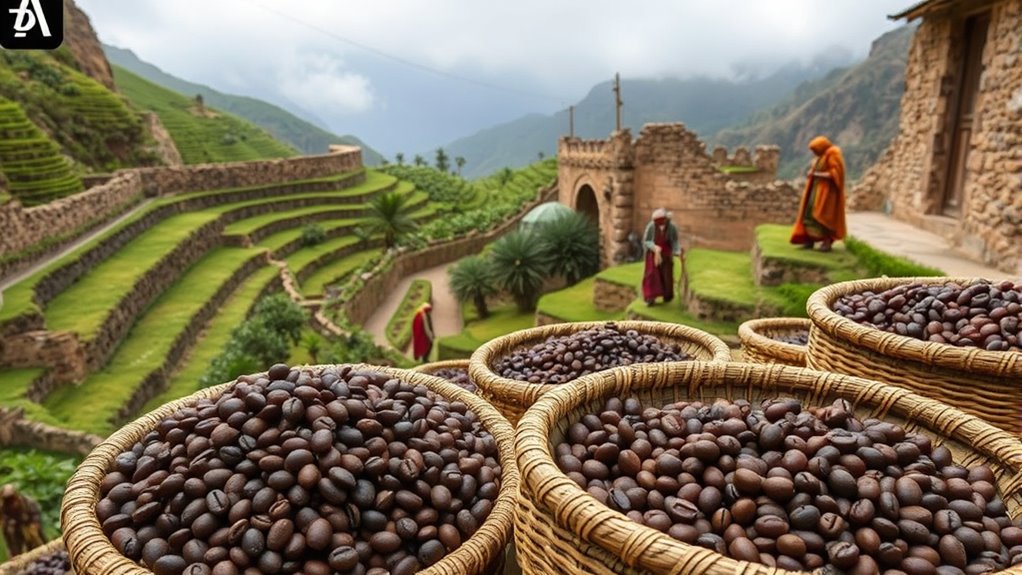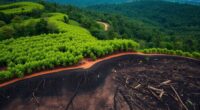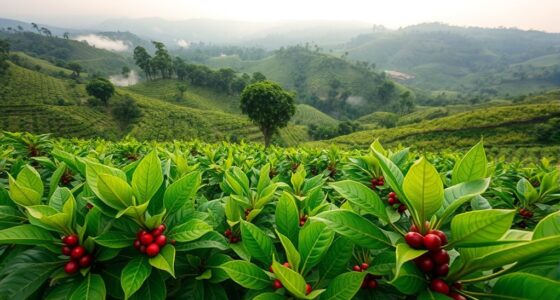Yemen’s coffee varies by region, with Haraz offering bright, fruity, and spicy flavors from its high-altitude, volcanic soils, while Ismaili presents a fuller-bodied, chocolaty, and nutty profile influenced by different microclimates. Traditional cultivation and brewing methods enhance these unique character traits. If you explore further, you’ll discover how each region’s environment shapes the distinct flavors, inviting you to deepen your appreciation of Yemen’s rich coffee heritage.
Key Takeaways
- Haraz coffee features a medium body with bright acidity, fruity, and spicy notes from high-altitude, volcanic soils.
- Ismaili coffee offers a full-bodied, chocolaty, nutty flavor with smoky undertones influenced by valley cultivation.
- Regional climate and terrain significantly shape each region’s distinct flavor profile and aroma.
- Traditional Yemen brewing methods like dallah and cezve enhance regional flavor nuances.
- Understanding these regional differences enriches the overall Yemen coffee tasting experience.

Have you ever wondered what makes Yemen coffee so unique? It all starts with the rich history and distinct regional flavor profiles that define the country’s coffee. Yemen’s diverse climate and terrain create a variety of microclimates, each shaping the flavor of the beans grown there. When you’re exploring Yemen coffee, you’ll notice that the regional flavor profiles vary markedly from one area to another, making each cup a story of its origin. For instance, coffee from the Haraz region offers a different experience compared to Ismaili coffee, largely because of differences in altitude, soil, and traditional cultivation methods. These factors influence the coffee beans’ characteristics, leading to unique taste profiles that can’t be replicated elsewhere.
Yemen coffee’s unique flavors stem from regional climates, soils, and traditional cultivation methods shaping each distinct cup.
The way you prepare Yemen coffee, or your coffee brewing method, can further highlight these regional flavors. Many Yemen coffee beans are traditionally brewed using a dallah or a cezve, which allows the coffee’s nuanced flavors to develop fully. When brewing Yemen coffee, pay attention to the grind size; a finer grind often works best to extract the full spectrum of flavors. This process emphasizes the natural sweetness and complex acidity inherent to the beans, especially when brewed slowly and carefully. Yemen’s coffee culture values patience and precision, so your coffee brewing technique can truly make a difference in experiencing the full depth of these regional flavor profiles.
In Haraz, the coffee tends to have a medium body with bright acidity and notes of fruit and spice. The high-altitude environment and volcanic soil contribute to a vibrant, lively flavor that’s both invigorating and complex. When you brew Haraz coffee, you might notice a slight tanginess balanced with earthy undertones. On the other hand, Ismaili coffee, often cultivated in different valleys, has a more subdued acidity with a fuller body. Its flavor profile features rich, chocolaty notes with hints of nuts and sometimes a smoky undertone. The regional differences in climate and soil translate directly into the taste, making each region’s coffee distinct.
Understanding these regional flavor profiles enriches your appreciation of Yemen coffee, especially when you consider how your chosen brewing method can amplify or mellow these traits. Whether you prefer a slow drip, a Turkish-style brew, or a traditional Yemen-style preparation, the goal is to bring out the best qualities of each region’s beans. So, next time you brew Yemen coffee, think about its regional origins and how your brewing technique can reveal a world of flavors that tell the story of Yemen’s diverse landscape.
Frequently Asked Questions
What Unique Brewing Methods Are Traditional in Yemen?
You should try Yemen’s traditional brewing methods, which often involve unique coffee ceremonies that emphasize hospitality and community. One notable technique is the slow, deliberate preparation using a jebena, a clay pot, where coffee is boiled over an open flame. This method enhances the rich flavors and aromas. Participating in these coffee ceremonies allows you to experience Yemen’s cultural heritage, making your coffee experience truly authentic and memorable.
How Does Altitude Affect Yemen Coffee Flavor Profiles?
Altitude influences Yemen coffee’s flavor profile like a master sculptor shaping clay. Higher elevations slow the bean’s ripening, allowing complex flavors to develop fully, resulting in vibrant, nuanced notes. You’ll notice a brighter, more aromatic cup that dances on your palate. As the altitude rises, the coffee’s character deepens, offering a unique sensory journey. So, when you sip Yemeni coffee, remember it’s the altitude’s touch that crafts its extraordinary taste.
Are There Specific Yemen Coffee Varieties Exclusive to Haraz or Ismaili?
You’ll find that Haraz and Ismaili regions each have unique local coffee varietals tied to their regional customs. While there aren’t strictly exclusive varieties, these areas cultivate specific strains adapted to their altitude and climate, influencing flavor profiles. Your experience with these coffees will showcase distinct regional characteristics, reflecting local traditions in cultivation and processing. Exploring these varietals offers a deeper understanding of Yemen’s rich coffee heritage.
What Are the Best Local Festivals Celebrating Yemen Coffee?
You’ll find that the best local festivals celebrating Yemen coffee often coincide with the coffee harvest season, creating lively events filled with tradition. In Haraz and Ismaili, these festivals showcase vibrant dance, music, and ceremonial coffee tastings that honor centuries-old traditions. Participating in these celebrations lets you experience Yemen’s rich coffee culture firsthand, making it an unforgettable journey into the heart of Yemen’s coffee heritage.
How Can Travelers Ethically Source Yemen Coffee Today?
To ethically source Yemen coffee today, you should prioritize fair trade and direct trade practices. Seek out suppliers committed to fair wages and sustainable farming methods, ensuring you support local farmers directly. Buy from reputable importers who verify their supply chains and promote transparency. By doing so, you help preserve Yemen’s rich coffee heritage while ensuring farmers receive fair compensation for their hard work.
Conclusion
As you explore Yemen’s rich coffee traditions in Haraz and Ismaili, you might find it’s more than just coffee—it’s a journey of unexpected connections. Just like discovering that a local’s story mirrors your own, tasting Yemen’s brew reveals shared passions and histories. So, next time you sip, remember how coincidence brought you here, blending worlds through a single cup. Yemen’s coffee isn’t just a drink; it’s a serendipitous encounter waiting to happen.









